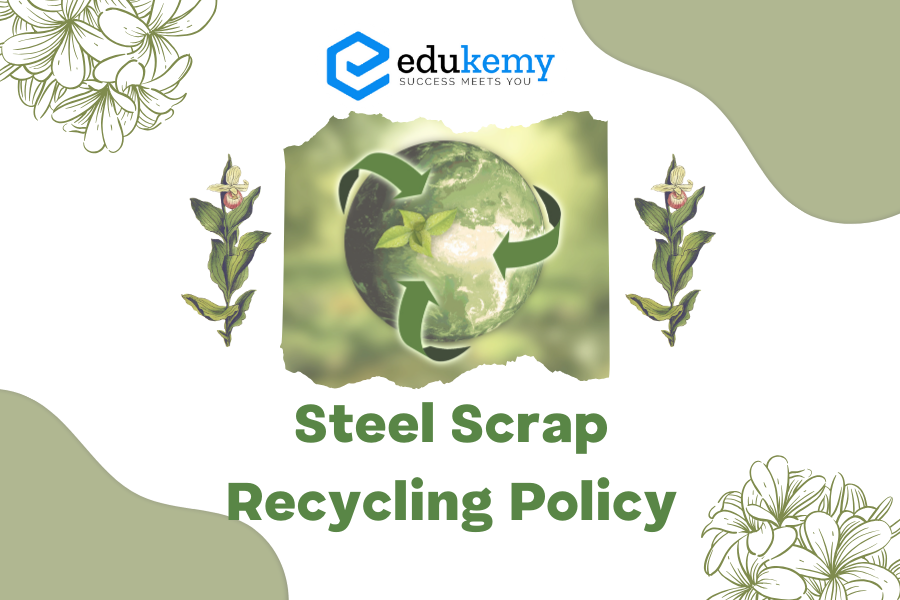- To guarantee high-quality scrap for the steel industry, the government has introduced a Steel Scrap Recycling Policy.
- This initiative aims to decrease imports, preserve resources, and enhance energy conservation.
- The policy is a direct outcome of the National Steel Policy of 2017, wherein the country aspires to achieve a steel production capacity of 300 million metric tons per year by 2030.
Contents
- 1 FAQs – STEEL SCRAP RECYCLING POLICY
- 1.1 Q1: What is the Steel Scrap Recycling Policy?
- 1.2 Q2: What prompted the need for this policy?
- 1.3 Q3: How does the policy address the concerns related to scrap processing and recycling?
- 1.4 Q4: What are the benefits of using quality scrap in steel production?
- 1.5 Q5: How does the use of scrap contribute to resource conservation?
- 1.6 Q6: What concerns have been raised regarding the Steel Scrap Recycling Policy?
- 2 In case you still have your doubts, contact us on 9811333901.
NEED FOR THE POLICY IN THIS REGARD
- In the fiscal year 2017-18, the nation’s steel scrap imports amounted to Rs 24,500 crore, resulting in a deficit of 7 million metric tons.
- The scrap policy has been devised to facilitate the organized, safe, and environmentally friendly processing and recycling of products.
- It aims to establish a responsive ecosystem and generate high-quality ferrous scrap to support quality steel production, thereby reducing dependency on imports.
- The strategic implementation of the scrapping policy is anticipated to diminish the gap between demand and supply of scrap, potentially making the country self-sufficient in this aspect by the year 2030.
- The policy’s primary objective is to ensure the availability of quality scrap for the steel industry.
USE OF SCRAP AND BENEFITS ASSOCIATED
- Quality scrap plays a crucial role as an input for electric furnaces.
- When electric furnaces are charged with high-quality scrap, they can efficiently produce high-grade steel.
- Processing scrap through scrap processing centers and shredders ensures that high-grade steel scrap is free from impurities.
- The global trend is leaning towards increasing steel production with scrap as the primary raw material, given that recycling scrap not only conserves vital natural resources but also brings numerous other benefits.
- The utilization of each tonne of scrap contributes to substantial resource conservation, saving 1.1 tonnes of iron ore, 630 kg of coking coal, and 55 kg of limestone.
- This approach results in a significant reduction in specific energy consumption as well.
CONCERNS
The policy has prompted various market concerns, encompassing apprehensions about an influx of mixed metal (unprocessed) scrap into the country and the difficulties associated with establishing recycling centers.
FAQs – STEEL SCRAP RECYCLING POLICY
Q1: What is the Steel Scrap Recycling Policy?
A1: The Steel Scrap Recycling Policy is an initiative introduced by the government to ensure a consistent and high-quality supply of scrap for the steel industry. It aims to reduce imports, conserve resources, and promote energy efficiency in alignment with the goals set in the National Steel Policy of 2017.
Q2: What prompted the need for this policy?
A2: The policy was necessitated by the increasing deficit in steel scrap imports, valued at Rs 24,500 crore in the fiscal year 2017-18, coupled with the goal outlined in the National Steel Policy to achieve a steel production capacity of 300 million metric tons per year by 2030. The objective is to foster organized, safe, and environmentally friendly processing and recycling of products, generating high-quality ferrous scrap and minimizing dependence on imports.
A3: The policy addresses concerns by emphasizing the establishment of organized and environmentally friendly scrap processing and recycling practices. It aims to create a responsive ecosystem, ensuring the production of high-quality ferrous scrap, thereby reducing the gap between demand and supply of scrap.
Q4: What are the benefits of using quality scrap in steel production?
A4: Quality scrap serves as a crucial input for electric furnaces, enabling the production of high-grade steel. Utilizing scrap processed through centers and shredders ensures that the resulting steel is free from impurities. The global trend favors increasing steel production with scrap as the primary raw material due to its benefits in conserving natural resources and energy efficiency.
Q5: How does the use of scrap contribute to resource conservation?
A5: Utilizing each tonne of scrap in steel production saves 1.1 tonnes of iron ore, 630 kg of coking coal, and 55 kg of limestone. This approach results in a significant reduction in specific energy consumption, contributing to the conservation of vital natural resources.
Q6: What concerns have been raised regarding the Steel Scrap Recycling Policy?
A6: Market concerns include fears of an influx of mixed metal (unprocessed) scrap into the country and challenges associated with establishing recycling centers. The policy has prompted discussions around effectively addressing these concerns to ensure its successful implementation.
In case you still have your doubts, contact us on 9811333901.
For UPSC Prelims Resources, Click here
For Daily Updates and Study Material:
Join our Telegram Channel – Edukemy for IAS
- 1. Learn through Videos – here
- 2. Be Exam Ready by Practicing Daily MCQs – here
- 3. Daily Newsletter – Get all your Current Affairs Covered – here
- 4. Mains Answer Writing Practice – here

